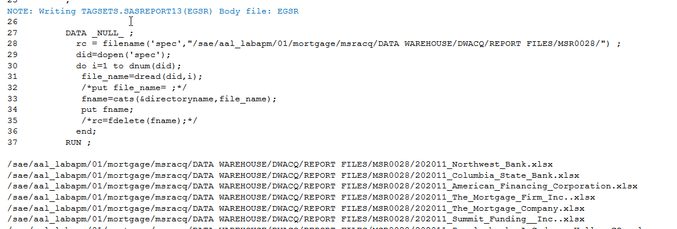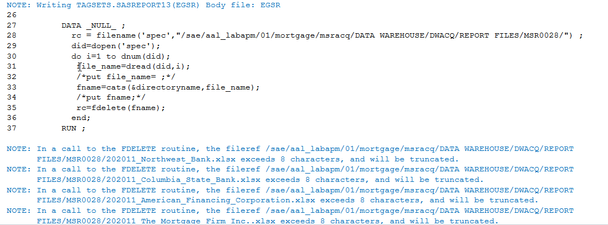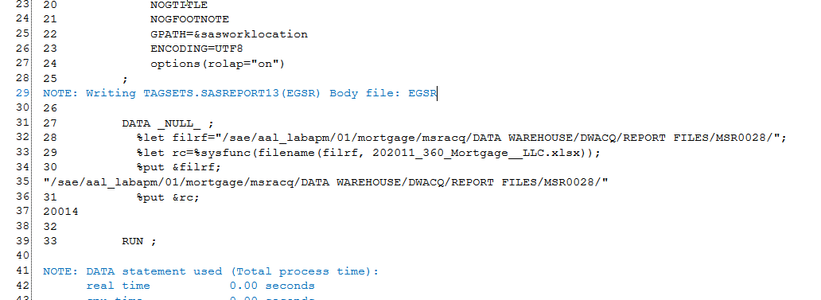- Home
- /
- Programming
- /
- Programming
- /
- Re: how to delete all files in data step using fdelete function
- RSS Feed
- Mark Topic as New
- Mark Topic as Read
- Float this Topic for Current User
- Bookmark
- Subscribe
- Mute
- Printer Friendly Page
- Mark as New
- Bookmark
- Subscribe
- Mute
- RSS Feed
- Permalink
- Report Inappropriate Content
FILENAME spec "%sysfunc(pathname(fptotb,f))/have.rtf" ;
DATA _NULL_ ;
rc = FDELETE('spec') ;
RUN ;Hi In my folder, there are rft, lst, log, 7bdat are created with same name during a data step which i need to delete. for example, the temp file are have.rtf, have.log, have.lst, have.7bdat. With above pgm I am able to delete only rtf. How to remove all in step. Please suggest. Thank you
- Mark as New
- Bookmark
- Subscribe
- Mute
- RSS Feed
- Permalink
- Report Inappropriate Content
Hi,
maybe if you do know files extensions in advance you can loop:
data _null_;
fname="tempfile";
length ext $ 20;
do ext = "rtf", "lst", "log", "sas7bdat", "txt";
rc=filename(fname, "%sysfunc(pathname(work))/have." !! strip(ext));
if rc = 0 and fexist(fname) then
rc=fdelete(fname);
rc=filename(fname);
end;
run;
all the best
Bart
Polish SAS Users Group: www.polsug.com and communities.sas.com/polsug
"SAS Packages: the way to share" at SGF2020 Proceedings (the latest version), GitHub Repository, and YouTube Video.
Hands-on-Workshop: "Share your code with SAS Packages"
"My First SAS Package: A How-To" at SGF2021 Proceedings
SAS Ballot Ideas: one: SPF in SAS, two, and three
SAS Documentation
- Mark as New
- Bookmark
- Subscribe
- Mute
- RSS Feed
- Permalink
- Report Inappropriate Content
- Mark as New
- Bookmark
- Subscribe
- Mute
- RSS Feed
- Permalink
- Report Inappropriate Content
If you must use function fdelete(), then this works:
%* create files;
data _null_;
file "%sysfunc(pathname(work))/have.txt" ; put 'a';
file "%sysfunc(pathname(work))/have.csv" ; put 'a';
run;
filename SPEC "%sysfunc(pathname(work))/have.*" ;
%* List files;
data FILENAMES;
length _FILENAME $ 256;
infile SPEC filename=_FILENAME;
input ;
FILENAME = _FILENAME;
run;
% Delete files;
data _null_;
set FILENAMES;
rc=filename ('TMPFREF',FILENAME);
rc=fdelete ('TMPFREF') ;
rc=filename ('TMPFREF');
run;
- Mark as New
- Bookmark
- Subscribe
- Mute
- RSS Feed
- Permalink
- Report Inappropriate Content
If you needn't use function fdelete(), then this is easier:
data _null_;
file "%sysfunc(pathname(work))/have.txt" ; put 'a';
file "%sysfunc(pathname(work))/have.csv" ; put 'a';
run;
filename DEL pipe "del ""%sysfunc(pathname(work))\have.*"" " ;
data FILENAMES;
infile DEL ;
input ;
put _infile_;
run;Any error messages generated during deletion go to the log window here, feel free to keep them in a table instead.
- Mark as New
- Bookmark
- Subscribe
- Mute
- RSS Feed
- Permalink
- Report Inappropriate Content
You can get the all the file name by the following code ,and write CALL EXECUTE() to delete them one by one.
DATA _NULL_ ;
rc = filename('spec','c:\temp') ;
did=dopen('spec');
do i=1 to dnum(did);
file_name=dread(did,i);
put file_name= ;
end;
RUN ;- Mark as New
- Bookmark
- Subscribe
- Mute
- RSS Feed
- Permalink
- Report Inappropriate Content
@Ksharp , I stumbled upon this post looking for an alternate way to delete files from my directory on a server than using the x command. Normally, if I use an x command with a wildcard to delete *.xlsx files it works, however, we are running into issues where it won't work for some reason.
Reading your reply, I got this syntax to work to generate a list of my files in that directory. Can you advise on how I would use the CALL EXECUTE() to delete the files now?
DATA _NULL_ ;
rc = filename('spec','c:\temp') ;
did=dopen('spec');
do i=1 to dnum(did);
file_name=dread(did,i);
put file_name= ;
end;
RUN ;
- Mark as New
- Bookmark
- Subscribe
- Mute
- RSS Feed
- Permalink
- Report Inappropriate Content
- Mark as New
- Bookmark
- Subscribe
- Mute
- RSS Feed
- Permalink
- Report Inappropriate Content
That last program to help me cat the variables in the file name was great. Thank you for that.
- Mark as New
- Bookmark
- Subscribe
- Mute
- RSS Feed
- Permalink
- Report Inappropriate Content
- Mark as New
- Bookmark
- Subscribe
- Mute
- RSS Feed
- Permalink
- Report Inappropriate Content
I have tried a few ways and can't get it to work correctly.
I could only get the directory name working if I created a variable. I think that's probably an extra step but couldn't get it to work otherwise. If I run this code with the put fname uncommented, I see the complete path and file name in the SAS log.
%let directoryname = "/sae/aal_labapm/01/mortgage/msracq/DATA WAREHOUSE/DWACQ/REPORT FILES/MSR0028/";
DATA _NULL_ ;
rc = filename('spec',"/sae/aal_labapm/01/mortgage/msracq/DATA WAREHOUSE/DWACQ/REPORT FILES/MSR0028/") ;
did=dopen('spec');
do i=1 to dnum(did);
file_name=dread(did,i);
/*put file_name= ;*/
fname=cats(&directoryname,file_name);
put fname;
/*rc=fdelete(fname);*/
end;
RUN ;
I am thinking, "OK, these are the files I need deleted, let's go".
I run the code with rc=fdelete(fname);
DATA _NULL_ ;
rc = filename('spec',"/sae/aal_labapm/01/mortgage/msracq/DATA WAREHOUSE/DWACQ/REPORT FILES/MSR0028/") ;
did=dopen('spec');
do i=1 to dnum(did);
file_name=dread(did,i);
/*put file_name= ;*/
fname=cats(&directoryname,file_name);
/*put fname;*/
rc=fdelete(fname);
end;
RUN ;I now get the following notes in the log and the files have not been deleted:
I have been referencing this documentation from SAS as well and just can't seem to put it all together.
- Mark as New
- Bookmark
- Subscribe
- Mute
- RSS Feed
- Permalink
- Report Inappropriate Content
- Mark as New
- Bookmark
- Subscribe
- Mute
- RSS Feed
- Permalink
- Report Inappropriate Content
I tried this according to the SAS documentation I found. I just can't put it all together.
%let directoryname = "/sae/aal_labapm/01/mortgage/msracq/DATA WAREHOUSE/DWACQ/REPORT FILES/MSR0028/";
DATA _NULL_ ;
rc = filename('spec',"/sae/aal_labapm/01/mortgage/msracq/DATA WAREHOUSE/DWACQ/REPORT FILES/MSR0028/") ;
did=dopen('spec');
do i=1 to dnum(did);
file_name=dread(did,i);
/*put file_name= ;*/
fname=cats(&directoryname,file_name);
/*put fname;*/
/*rc=fdelete(fname);*/
end;
RUN ;
%macro test;
%let filrf= "/sae/aal_labapm/01/mortgage/msracq/DATA WAREHOUSE/DWACQ/REPORT FILES/MSR0028/";
%let rc=%sysfunc(filename(filrf, file_name=));
%if &rc ne 0 %then %put %sysfunc(sysmsg());
%let rc=%sysfunc(filename(filrf));
%mend test;
- Mark as New
- Bookmark
- Subscribe
- Mute
- RSS Feed
- Permalink
- Report Inappropriate Content
- Mark as New
- Bookmark
- Subscribe
- Mute
- RSS Feed
- Permalink
- Report Inappropriate Content
Sorry for all of the back and forth. I promise I am not someone who needs their homework answered, I have just been racking my brain on this one and the other regarding the excel export files for a week. I try not to post for help unless it is a last resort.
I am trying it with a single file in that directory. When I try what looks right (and probably isn't at this point), I can %put the filrf but when I %put rc it gives me what looks like a number in the log.
DATA _NULL_ ;
%let filrf="/sae/aal_labapm/01/mortgage/msracq/DATA WAREHOUSE/DWACQ/REPORT FILES/MSR0028/";
%let rc=%sysfunc(filename(filrf, 202011_360_Mortgage__LLC.xlsx));
%put &filrf;
%put &rc;
RUN ;
Learn how use the CAT functions in SAS to join values from multiple variables into a single value.
Find more tutorials on the SAS Users YouTube channel.
SAS Training: Just a Click Away
Ready to level-up your skills? Choose your own adventure.








